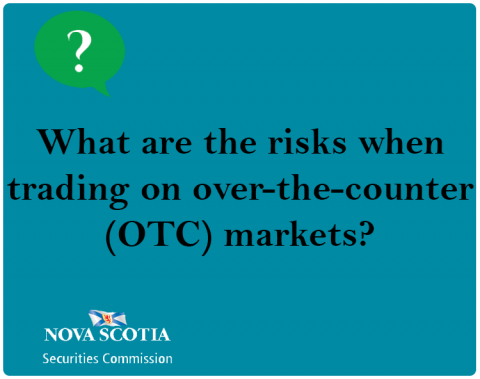Submitted by nsscadmin on

Over-the counter markets (OTC markets are marketplaces, not exchanges, where traders can buy and sell securities that have been issued by small companies. These securities typically have little liquidity because they are not frequently traded. Transactions on OTC markets are conducted directly between the buyer and the seller. Most companies and securities traded on OTC markets do not meet the listing criteria for large exchanges such as the NYSE, NASDAQ or TSX.
Securities purchased on OTC markets are considered high risk for the following reasons:
Low liquidity - As we already said, securities bought and sold on OTC markets are not frequently traded. Because of this they have low liquidity which could make them difficult to sell.
Lack of regulation – OTC markets have very little to no oversight by regulators. Companies and their securities traded on exchanges have rigorous listing conditions and ongoing regulations they must follow. Many companies that are unable to meet these conditions and regulations end up trading on OTC markets.
Lack of history – Many companies that trade on OTC markets have very little or no business history. This gives potential investors no reliable information to check or research before investing.
Pump and dump scams – Fraudsters use OTC markets to operate pump and dump schemes because there is less regulatory oversight and securities typically have low values. This allows fraudsters to buy a large amount of the security before promoting it heavily on the internet, social media and through boiler rooms. Increased interest in the security can cause a rapid rise in value (the Pump). The fraudsters then sell their securities for a large gain (the Dump). The remaining security holders will find it very difficult to sell their holdings and the value begins to decline quickly.
If you are thinking about purchasing securities on OTC markets make sure you understand what you’re purchasing and the risk you’re taking on. Does the purchase fit your risk tolerance? Will you be financially secure if you are unable to sell your securities quickly? Can you afford to lose the money? Do as much research into the company or security as you can to ensure it is legit and a worthwhile investment. As with any investment, do not invest more than you can afford to lose.
